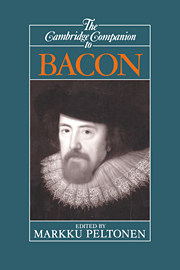Book contents
- Frontmatter
- Introduction
- 1 Bacon's idea of science
- 2 Bacon's classification of knowledge
- 3 Bacon's method of science
- 4 Bacon's forms and the maker's knowledge tradition
- 5 Bacon's speculative philosophy
- 6 Bacon as an advocate for cooperative scientific research
- 7 Bacon's science and religion
- 8 Bacon and rhetoric
- 9 Bacon and history
- 10 Bacon's moral philosophy
- 11 Bacon's political philosophy
- 12 Bacon's legacy
- Bibliography
- Index
Introduction
Published online by Cambridge University Press: 28 May 2006
- Frontmatter
- Introduction
- 1 Bacon's idea of science
- 2 Bacon's classification of knowledge
- 3 Bacon's method of science
- 4 Bacon's forms and the maker's knowledge tradition
- 5 Bacon's speculative philosophy
- 6 Bacon as an advocate for cooperative scientific research
- 7 Bacon's science and religion
- 8 Bacon and rhetoric
- 9 Bacon and history
- 10 Bacon's moral philosophy
- 11 Bacon's political philosophy
- 12 Bacon's legacy
- Bibliography
- Index
Summary
Francis Bacon has always had a central but controversial place in historical accounts of early modern philosophy. For some, he was the first spokesman of modern science in general and the father of its inductive method in particular. For others, he was an immoral charlatan who had nothing original to say. In the seventeenth and especially in the eighteenth century, when Bacon's reputation was at its peak, he was widely seen as the originator of modern science and philosophy. In the middle of the nineteenth century William Whewell could still bestow fulsome praise on Bacon - “the supreme Legislator of the modern Republic of Science.” The tide, however, was turning apace, and it soon became a commonplace to ridicule Bacon's philosophy and criticize his moral outlook.
Both of these negative assessments have proven surprisingly tenacious. While moral denunciation continues, the main contemporary criticism of Bacon concerns the shortcomings of his grand philosophical schemes and methodological views. But there has been little consensus as to where precisely Bacon's philosophical failure lay. For some present-day epistemologists, Bacon was a spokesman for a hopelessly naive induction by enumeration, and had thus nothing to do with the development of modern science. In striking contrast, the Frankfurt School criticized Bacon for being the very epitome of the modern scientific domination of nature and humankind However, although these censures are still occasionally repeated, tremendous strides have been made in Bacon scholarship. New and important material has been turned up and anachronistic criteria for assessing Bacon's philosophy have been abandoned. Several ghosts of nineteenth-century interpretation have been exorcised and a new detailed account of Bacon's philosophy has started to emerge. There has been, in fact, something of a transformation in Bacon studies during the last few decades.
- Type
- Chapter
- Information
- The Cambridge Companion to Bacon , pp. 1 - 24Publisher: Cambridge University PressPrint publication year: 1996
- 9
- Cited by



